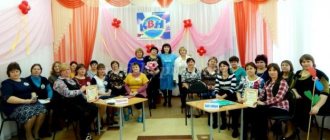Teachers' Council - KVN for kindergarten teachers
Teachers' Council - KVN "Let's communicate!" Scenario
(for teachers of preschool educational institutions)
Explanatory note The teacher must have knowledge about the patterns of communication and relationships in the teaching staff, with children, and in working with parents.
The use of various forms of methodological work increases the level of theoretical preparedness of the teacher and the development of his pedagogical position on the main problems of upbringing, training and development of the child and interpersonal interaction. Progress of KVN
Goal: to consolidate the knowledge of game participants about the peculiarities of communication with a child, to exercise in understanding the mental states of children, the ability to expediently express their attitude towards them using verbal and non-verbal means of communication. Develop creativity and love for the profession. Host: We are pleased to welcome in this cozy hall people who are convinced that childhood is one of the best periods of human life. Our KVN is dedicated to a very complex and very relevant topic - communication between an adult and a child. We will reflect on the problems of interaction, on ways and means of creating a joyful and cheerful mood in children while communicating with adults, while performing various tasks.
Presenter: Competent judges - the jury - will make a decision on the level of professional training of the participants and give useful advice and recommendations.
I competition. “Greeting” According to Russian custom, it is customary to greet each other and introduce yourself. II competition. “You - for me, I - for you” The presenter asks the teams questions in turn. For each correct answer, teams receive 1 point. 1. Man, as a product of socio-historical relations, having certain individual qualities. 2. The interaction of two or more people consisting of the exchange of information. 3. An automated way to perform an action. 4. Purposeful and systematic influence on a person in order to form in him certain forms of behavior, worldview, character and mental abilities. 5. Method of psychological research based on questions and answers. 6. An active attitude towards the surrounding reality, expressed in influencing it. 7. Urge to action, push, motivating reason 8. Brief tests designed to assess the level of certain psychological qualities. 9. Motivation to activity associated with the satisfaction of a specific need. 10. Naturally occurring response of the body to irritation (Answers 1 – personality, 2 – communication, 3 – skill, 4 – education, 5 – conversation, 6 – activity. 7 – stimulus, 8 – test, 9 – motive, 10 – reflex) .
III competition. Solving pedagogical situations Presenter: To solve pedagogical problems, 2 teachers from each team with short work experience are invited. The completeness and consistency of the answers is assessed. Situations for the first team
1. The teacher tells Natasha’s mother (6 years old) that the girl really likes to help adults. — Probably, at home you teach your child to do everything with you. This is very good - she will be your assistant. - Yes. My daughter has a very great desire to help me. Whatever work I take on, it’s right there. But what help is it? One obstacle. I send her for a walk, without her I can quickly manage the housework. And don’t stand on ceremony with her. There is no point in disturbing adults. Comment on the situation. What advice do you have for your mother? 2. Seeing that Vadik is going to draw in his free time, the teacher asks: “What are you going to draw and with what?” — How will you arrange the drawing on a sheet of paper? —What will you draw first, and what then? Reminds you that after drawing you need to put everything back in its place. Question: is such adult intervention necessary in children’s independent activities?
Situations for the second team 1. In the reception room, in the presence of children, one mother says to another: “Your Seryozha draws so well.” And my Dimka has only scribbles. No matter how much I tell him to draw carefully, he draws poorly every time. — Have you tried to teach him? — I often sit Dima down to draw while I do household chores so that he doesn’t bother me. He probably doesn't have the ability. Comment on your opinion on this conversation. Is Dima's mom right? What advice do you have for this boy's mother? 2. Seryozha (4 years old) at home in response to his dad’s question “What does the teacher do in the kindergarten, how does she work?” replied that she does not work, but plays with the children, walks and studies. In the evening, the mother, who is on maternity leave to care for her second child, laughingly tells the teacher about this conversation. The teacher called Seryozha over and asked him: “What does your mother do? What is she doing?" Serezha’s answer sounded like this: “My mother doesn’t work and doesn’t do anything. She sits with her little brother, goes to the store, does laundry and cleans the apartment.” Mom asks indignantly: “How is it Seryozha? Isn’t that work?” “No, they go to work and then get tired, like dad.” What is the reason for this child’s response? What advice would you give to Seryozha’s mother?
IV competition. “How will our word respond?” 1. Representatives of one team should say the phrase “You are my sunshine” with different emotional tones, representatives of the other “Finally” (joy, surprise, regret, anger, reproach, etc.). V competition. “Tell with your eyes” Host: They console and kiss with words, You can even insult with words, They take revenge for them, And they argue, and they fight... And the conclusion? You need to think before you say anything! There are wonderful non-verbal means that make our communication more colorful and emotional. Can we understand a person's feelings by his facial expressions? Let's check... Let's try... Each team is invited to act out a fairy tale using non-verbal means of communication. 1. Game - a fairy tale for the first team “Sparrow Family” “Once upon a time there lived a sparrow family in the forest: mother, father, son. Mom flew off to catch midges and feed the family. And dad, the sparrow, strengthened the house with twigs and insulated it with moss. The son also helped his father, and with this he always showed off to his friends. He tried to prove to everyone that he was the most dexterous and strong. And with those who did not agree with him, the sparrow quarreled and even fought. One day, mom and dad flew to the nest, but their son was not there. They were waiting for him for lunch, but the little sparrow did not arrive. His parents began to worry that the cats had eaten him. Papa Sparrow was angry and grumbled, and Mom even cried. After all, she thought that something had happened to her son. And my son quarreled with his friends. The disheveled little sparrow finally flew to his parents. And the sparrow family had a serious conversation. Little Sparrow had to admit that he was bragging and fighting. The son told his parents how he wanted to prove to everyone how grown up he was. Sparrow explained that he would really like his parents to be proud of him as their strongest son. But instead of joy and pride, he saw sadness in their eyes. Sparrow asked for forgiveness. And his parents forgave him. They fed their son delicious food and, stroking his feathers, affectionately explained that they loved him very much, and for them he was the most dexterous and strong sparrow in the whole forest.”
2. Game - a fairy tale for the second team “Naughty horse” “Once upon a time there was a horse who really loved to kick and be capricious. Her mother says to her: “Eat some fresh herbs, daughter.” “I don’t want to, I won’t,” the horse shouts and kicks its legs. Dad persuades the horse: “Go for a walk, play in the sun!” “I don’t want to, I won’t go,” the horse answers and kicks again. Mom and dad couldn’t persuade their stubborn daughter, so they left her at home and went out on business. The horse thought, thought, and went for a walk alone. And a cunning gray wolf meets her. The wolf says to the horse: “Don’t go, horse, far into the forest, you’re still small.” The horse is stubborn again: “I’m not little, I go wherever I want!” And that’s what the wolf needed. He waited until the horse entered the very thick of the forest and pounced on it from behind. Horse, let's kick. First, she hit the wolf hard with one leg, then with the other leg. And then she started kicking with both legs together so much that the wolf ran away, and no one saw him there anymore. The horse stopped being stubborn and capricious, grew up and now works in the circus, kicks its legs, throws balls high to the delight of the audience. And he’s no longer capricious.” VI Captain Competition Presenter: Before us are 2 captains, two experienced teachers. Find a way out of an extreme situation. Situations are set by opposing teams VII competition “Skillful Hands” Presenter: You have been asked homework: ways to calm a crying child. Playing out the situation. Evaluated: originality of the toy, resourcefulness, mobility.
Summing up the jury's results.
winning team Literature: 1. O.M. Eltsova. Workshop on professional communication of teachers: recommendations, games, trainings. Volgograd. Teacher. 2010 2. V.P. Dubrova, E.P. Milosevic. Organization of methodological work in a preschool institution. Moscow. 1995
We recommend watching:
Meeting of the parent club in the kindergarten “My Family” Meeting of the family club “Karapuz” (early age) on the topic “About health - seriously” Cognitive development of children 2-3 years old Theatrical activities in kindergarten
Similar articles:
How to get your child interested in reading
Introducing children 5-6 years old to fiction
Preparation
Preparation for the orientation pedagogical council is outlined in the director’s order - it includes the collection of indicators, analytical work for the past year, development of reports, forecasts and plans. You should not overload your employees with a lot of “extracurricular” work; the average time for a report is planned at 5-10 minutes.
According to the Federal State Educational Standard, the plan for the next year should take into account:
- Social and communicative development of the child;
- Cognitive development;
- Speech development;
- Artistic and aesthetic development;
- Physical culture.
Based on these standards, the pedagogical council works in the following areas:
- Analytical.
The results of work over the past year are compared, omissions and achievements are assessed. A good place to start is by evaluating the formal curriculum.
- Sociable.
The degree of communication skills of the teacher with children and parents is assessed.
- Methodical.
Preparation of a discussion of educational methods, pedagogical literature, new programs.
- Empirical.
Exchange of experience between specialists, invitation to the pedagogical council of experienced teachers and experts.
The preparation plan for the teachers' council is outlined by date in the director's order, each employee is given an area of research with a designated deadline.
Organization and holding
The pedagogical council of the preschool educational institution for the Federal State Educational Standard is appointed on a certain date and time. The secretary announces the opening of the meeting, the director (chairman) makes a welcoming speech. Next comes a discussion of issues according to the agenda specified in the order.
In order to keep the event short, you can develop regulations in the preschool educational institution, indicating the time frame for speeches, as well as taking 2 or 3 breaks at the rate of 1 hour of meetings for 15 minutes. In small institutions this does not make much sense.
To make the secretary's work easier, it makes sense to use video equipment or a voice recorder.
This will greatly simplify the subsequent work of drawing up minutes, especially if the meeting is active and there are a lot of comments and discussions.
Scenarios for the orientation of the teachers' council can be anything; some leaders conduct them in the form of a court, a quiz, KVN, or television programs. This artistic approach allows you to enliven the situation, however, it requires longer preparation, distribution of roles and preparation of subsequent documentation.
The main conclusions from the minutes of the orientation teachers' meeting can be distributed to all participants and teachers so that employees can remember the goals and latest changes for the next year at any time.
Tags: children


